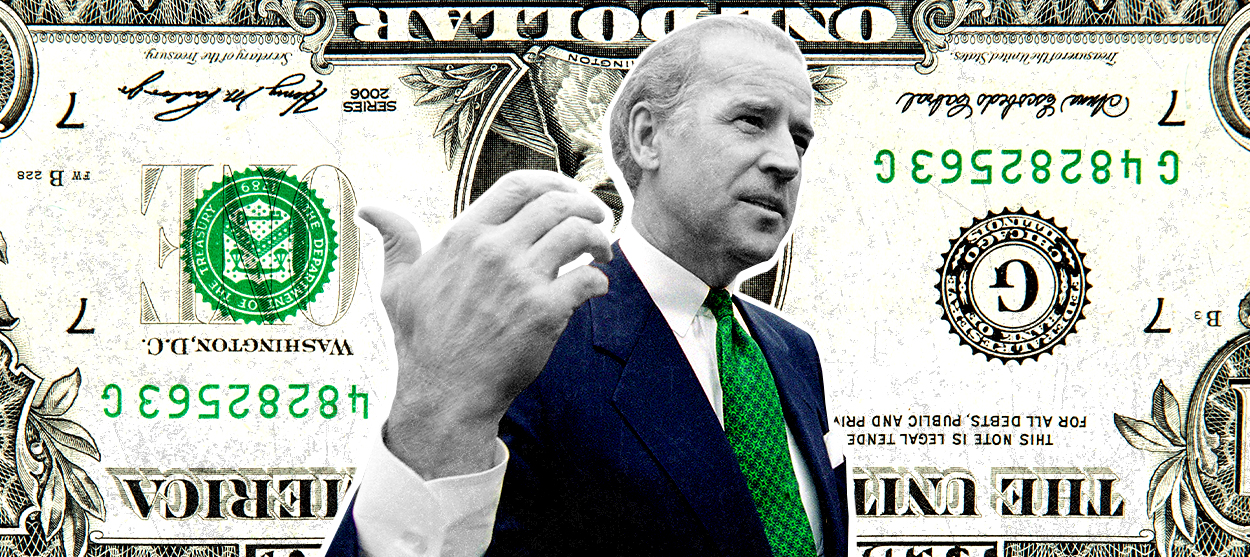Joe Biden's history of austerity
He's pushed for cuts to Social Security and Medicare for decades


A free daily email with the biggest news stories of the day – and the best features from TheWeek.com
You are now subscribed
Your newsletter sign-up was successful
Is Joe Biden, contrary to his centrist reputation, a tax-and-spend liberal? That was the argument made by Politifact's Amy Sherman, defending him against accusations from the Bernie Sanders camp that in 2018, "Biden lauded Paul Ryan for proposing cuts to Social Security and Medicare." Not so, says Politifact: "The Sanders campaign plucked out part of what Biden said but omitted the full context of his comments. We rate this statement False."
Unfortunately, it's a tendentious argument that totally misreads Biden's politics and history. He did indeed call for cuts to Social Security and Medicare in a 2018 speech at the Brookings Institution — part of a decades-long career of hawking pointless austerity. Yet, just like they did with Medicare-for-all, fact checkers are bending the truth to advance an ideological centrist agenda.
In the speech in question, Biden attacked Paul Ryan's tax cut for the rich before pivoting to the question of Social Security and Medicare:
The Week
Escape your echo chamber. Get the facts behind the news, plus analysis from multiple perspectives.

Sign up for The Week's Free Newsletters
From our morning news briefing to a weekly Good News Newsletter, get the best of The Week delivered directly to your inbox.
From our morning news briefing to a weekly Good News Newsletter, get the best of The Week delivered directly to your inbox.
Paul Ryan was correct when he did the tax code. What’s the first thing he decided we had to go after? Social Security and Medicare. Now, we need to do something about Social Security and Medicare. That’s the only way you can find room to pay for it.Now, I don’t know a whole lot of people in the top one-tenth of 1 percent or the top 1 percent who are relying on Social Security when they retire. I don’t know a lot of them. Maybe you guys do. So we need a pro-growth, progressive tax code that treats workers as job creators, as well, not just investors; that gets rid of unprotective loopholes like stepped-up basis; and it raises enough revenue to make sure that the Social Security and Medicare can stay, it still needs adjustments, but can stay; and pay for the things we all acknowledge will grow the country. [Brookings]
The Biden campaign claimed to Sherman that "he was mocking Ryan," and Sherman notes that Biden had said many times that he wanted to protect these programs. Therefore he didn't endorse any cuts.
This is not true, but you need to be well-versed in Beltwayese to understand what Biden means by "do something" and "adjustments." For decades, Social Security and Medicare have been the bugbears of centrist austerians who (supposedly) want to cut the federal budget deficit. By this view, these expensive social programs are dragging down the economy, and they will have to be trimmed to deal with excessive borrowing. It's part of a centrist deficit scold ideology that views responsible politics as forcing the American people to drink their tough medicine so we can make the economy grow.
Biden has been proposing cuts to Social Security and Medicare for decades on exactly these grounds. In 1984 he proposed freezing Social Security benefits — that is, ending cost-of-living adjustments that boost benefits to keep up with inflation. In January 1995 he gave a speech endorsing a balanced budget amendment (an utterly lunatic policy) and boasted about his previous record of proposing "that we freeze every single solitary program in the government, anything the government had to do with, every single solitary one, that we not spend a penny more, not even accounting for inflation, than we spent the year before." In November 1995 he did so again, boasting that "I tried with Senator Grassley back in the '80s to freeze all government spending, including Social Security, including everything."
Importantly, Biden and company often framed these cuts as "protecting" the programs, because making them less generous would make them more sound in an accounting sense, which is where all his past statements supposedly defending them come from. (Basically, in order to avoid future welfare cuts, we need to cut welfare now.) Sherman apparently isn't familiar with this evasive rhetoric.
A free daily email with the biggest news stories of the day – and the best features from TheWeek.com
Biden continued to push this basic view in the 2008 presidential primary campaign, though moderated somewhat. In a 2007 interview with Tim Russert on Meet the Press he said he would consider raising the Social Security retirement age (effectively a large benefit cut, as it would push back the age at which seniors can begin collecting benefits) and cutting cost-of-living increases. "Absolutely, you have to," he said. Sure enough, his campaign released a plan which included "options such as upping the retirement age[.]" He endorsed the idea again during a primary debate (to be fair, he also endorsed removing the payroll tax cap to add revenue).
And while Biden was vice president the Obama administration attempted to get a "grand bargain" with Republicans that would have traded massive cuts to Social Security and Medicare in return for some modest tax hikes on the rich, with the overall goal of cutting the deficit — just as Biden had been trying to do for his whole Senate career. (It only fell through because far-right Republicans refused to accept any compromise.)
So Biden was mocking Ryan for trying to cannibalize Social Security and Medicare to pay for his tax cuts, but in the process Biden endorsed his usual line that we need to cut these programs at least somewhat to make them solvent over the long term and keep down the deficit. "I don't know a whole lot of people in the top one-tenth of 1 percent or the top 1 percent who are relying on Social Security when they retire" clearly implies that benefits for those people could be cut without harming them. Saying that Biden lauded Ryan for doing so is arguably an exaggeration, but he absolutely did say cuts should happen.
Politifact simply doesn't know what it is talking about — it is Sherman who did not consider the relevant context.
But more importantly, it's worth remembering that the entire justification for Biden's career of pushing austerity is hogwash. For one thing, Social Security and Medicare are very different programs. On the current policy track, the former does face a financing issue, but not until 2034. Indeed, its major problem is that it is not generous enough, with tens of millions of Baby Boomers set to retire soon who have hardly any savings. Social Security benefits should be increased across the board, especially by adding a minimum benefit for people without much earning history — but this could easily be accomplished with a modest tax increase mainly on the rich.
Medicare, on the other hand, actually is projected to consume an ever-increasing fraction of federal spending (together with Medicaid and other programs). But this is because of cost bloat in the medical sector, not over-generous benefits. Indeed, American health care spending is so outrageously high that we already take in more tax money for health care than most rich countries, and we don't even get universal coverage. In other words, if we were to transplant Canada's universal Medicare system into America, taxes would go down.
Cutting benefits alone would accomplish nothing on this problem, because skyrocketing cost increases would quickly eat up any savings. It would be far wiser to expand Medicare (ideally to everyone), so as to get the greatest possible administrative savings, and to get the greatest possible leverage over price-gouging medical providers. But because this possibility doesn't involve inflicting pain on the American people, centrists studiously ignore it.
Biden's career has been one long exercise in overlooking obvious facts and pushing horrible, pointless policy to seem Serious and Responsible to the centrist rubes of the Beltway press. As Democrats head to the primary polls, let's not forget that history.
Want more essential commentary and analysis like this delivered straight to your inbox? Sign up for The Week's "Today's best articles" newsletter here.
Ryan Cooper is a national correspondent at TheWeek.com. His work has appeared in the Washington Monthly, The New Republic, and the Washington Post.
-
 How the FCC’s ‘equal time’ rule works
How the FCC’s ‘equal time’ rule worksIn the Spotlight The law is at the heart of the Colbert-CBS conflict
-
 What is the endgame in the DHS shutdown?
What is the endgame in the DHS shutdown?Today’s Big Question Democrats want to rein in ICE’s immigration crackdown
-
 ‘Poor time management isn’t just an inconvenience’
‘Poor time management isn’t just an inconvenience’Instant Opinion Opinion, comment and editorials of the day
-
 The ‘mad king’: has Trump finally lost it?
The ‘mad king’: has Trump finally lost it?Talking Point Rambling speeches, wind turbine obsession, and an ‘unhinged’ letter to Norway’s prime minister have caused concern whether the rest of his term is ‘sustainable’
-
 The billionaires’ wealth tax: a catastrophe for California?
The billionaires’ wealth tax: a catastrophe for California?Talking Point Peter Thiel and Larry Page preparing to change state residency
-
 Bari Weiss’ ‘60 Minutes’ scandal is about more than one report
Bari Weiss’ ‘60 Minutes’ scandal is about more than one reportIN THE SPOTLIGHT By blocking an approved segment on a controversial prison holding US deportees in El Salvador, the editor-in-chief of CBS News has become the main story
-
 Memo signals Trump review of 233k refugees
Memo signals Trump review of 233k refugeesSpeed Read The memo also ordered all green card applications for the refugees to be halted
-
 Has Zohran Mamdani shown the Democrats how to win again?
Has Zohran Mamdani shown the Democrats how to win again?Today’s Big Question New York City mayoral election touted as victory for left-wing populists but moderate centrist wins elsewhere present more complex path for Democratic Party
-
 Millions turn out for anti-Trump ‘No Kings’ rallies
Millions turn out for anti-Trump ‘No Kings’ ralliesSpeed Read An estimated 7 million people participated, 2 million more than at the first ‘No Kings’ protest in June
-
 Democrats: Harris and Biden’s blame game
Democrats: Harris and Biden’s blame gameFeature Kamala Harris’ new memoir reveals frustrations over Biden’s reelection bid and her time as vice president
-
 ‘We must empower young athletes with the knowledge to stay safe’
‘We must empower young athletes with the knowledge to stay safe’Instant Opinion Opinion, comment and editorials of the day
